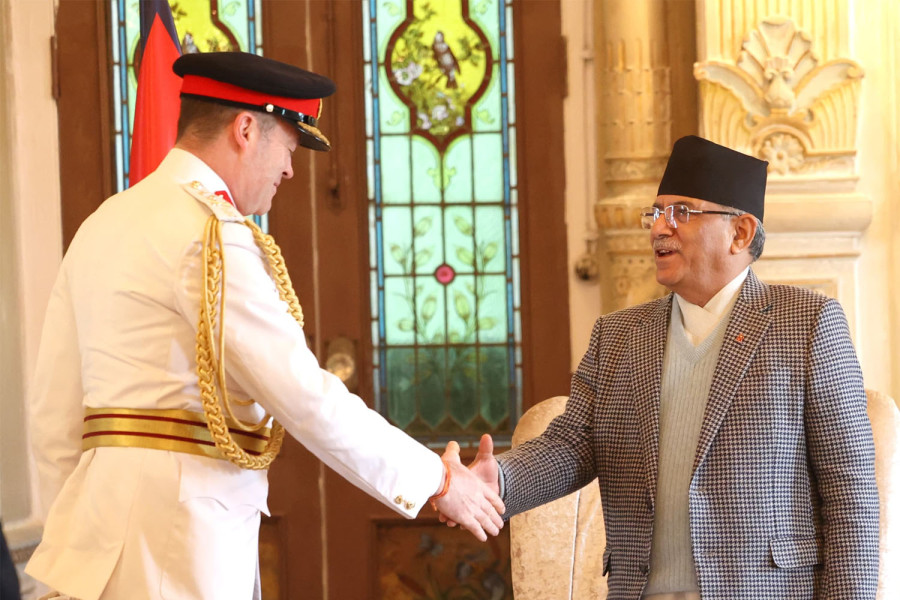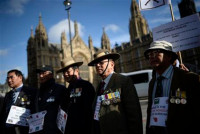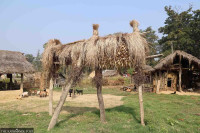National
Nepali leaders raise Gurkha pension issue with visiting British army chief
Gen Sanders says the UK is serious about addressing the demands raised by the Gurkha veterans.
Post Report
The visiting head of British Army General Sir Patrick Sanders called on Prime Minister Pushpa Kamal Dahal, Deputy Prime Minister and Minister for Defence Purna Bahadur Khadka, Foreign Minister NP Saud and Chief of Army Staff General Prabhu Ram Sharma and discussed various facets of Nepal-UK ties including proving equal pensions to the Gurkhas in the British Army.
Dahal, Khadka and Saud are learnt to have raised the issues of equal pensions and welfare benefits for the Gurkha veterans.
Deputy PM Khadka, praising the role of the Gurkhas in the British Army, urged the visiting army chief to address the issue of equal pensions and welfare schemes for the Gurkha veterans, who retired before 1997, read a statement issued by the private secretariat of Khadka.
In response, the British army chief said that the British government and the army are serious about addressing the demands raised by the Gurkha veterans.
In 2009 with the help of British actress Joanna Lumley, Gurkhas who retired before 1997 won the right to settle in the UK. But even so, the campaigners wanted more than just settlement rights. They have demanded equal pensions and welfare benefits for the Gurkha veterans.
The UK government, however, rejected the offer. As a result, in 2013 and 2021, ex-Gurkhas staged hunger strikes that lasted 15 and 13 days, respectively. Following the hunger strikes, the British government agreed to hold talks. But the campaigners are frustrated as the talks were either dismissed or delayed due to changes in the UK government.
In 2021, Gurkha veterans raised placards and banners while chanting slogans like 'Aayo Gorkhali', opposite Downing Street. Dressed in their army regalia, some of the Gurkha veterans participating in the protest were old and infirm but continued to raise their voices demanding fairness and equality for 13 consecutive days.
Some rounds of repatriate talks were held between the representatives of the government of Nepal, the United Kingdom and agitating Gurkhas veterans based on a joint report prepared by both sides but there has been no progress. The first meeting was held on November 3, 2022.
During the meeting with Gen Sanders, Foreign Minister Saud, recalling the centuries-long relations between the two countries and the contributions made by Nepal’s British Gurkhas, urged him to address the demands as soon as possible, according to Saud’s secretariat.
It won’t cost the British government huge if it addresses the demands of equal pension and other welfare schemes, the statement quoted Minister Saud as saying. “If that delivers justice to the Gurkhas, the UK government should address their demands.”
General Sanders also reportedly assured Saud that the UK government wants to address the issues that the Gurkha veterans have raised.
The agitating Gurkha veterans argue that since they were recruited into the British Army as per the tripartite agreement of 1947, they deserve equal pensions and benefits. The Gurkha veterans also submitted several memoranda to outgoing and incumbent British prime ministers.
The British government—which had earlier dismissed ex-Gurkhas’ claim for equal pension and pay for those who had retired or had been made redundant by the British Army before 2006—says that it will now only reconsider the demands on welfare and medical benefits. The 1947 agreement between Nepali, British and Indian governments had clearly outlined equal pay, pension and perks for Nepali youths serving the Indian and British armies.
The agreement also paved the way for the distribution between India and Britain of the Gurkha brigades serving in British India. Thus, the 2nd, 6th, 7th and 10th units of Gurkha Rifles became part of the British Army, while the remaining brigades were retained by the independent India.
The tripartite pact assures that all perks, remuneration, benefits and pension schemes for Nepalis serving in the British and Indian armies will be equal to those of British and Indian nationals. However, Gurkha veterans have long accused Britain of pursuing discriminatory policies on remuneration.
Sanders who arrived here on Monday will participate in various events and activities over the next few days. After he returns, a British minister is due to visit Kathmandu, according to foreign ministry sources.
Saud thanked the UK general for continued British support to Nepal’s development endeavours. He said that despite the difficult economic situation in the United Kingdom, the British support to Nepal will continue, reads the statement of Saud’s secretariat. The British assistance to Nepal would be focussed on jobs creation and tourism development as well as economic growth.
Later this week, he will travelling to Pokhara to attend the attestation parade for the latest intake of Nepali recruits joining the British Army.
In an interview with the BFBS Radio, Gen Sanders said: “The main reason to come here is, of course, attestation. When we take, I think it'll be 336 trainee riflemen and they swear their oath and they go off to Catterick.”
Catterick Garrison is a major military town in North Yorkshire, England. “But it's also because the strategic partnership, the relationship, the friendship between the UK and Nepal matters to us enormously,” he said about the motive for the visit.
“It's an opportunity for me to meet some of your country's leaders, political leaders and military leaders, and reinforce those bonds of friendship and just ensure that we keep that historic relationship going at the level that it's been,” Sanders added.
Asked if he had any messages for the Gurkhas and their community, he told the BFBS radio: "First of all, one of the encouragements is to keep doing what they're doing. Because we have a deep bond of affection and respect for the Gurkha riflemen and indeed all Gurkhas who serve in the brigade in the British Army.”
Their loyalty, their resilience, their toughness and their professionalism are hallmarks, said Sanders of the Gurkhas. “These are bywords for the brigade and we in the British Army are immeasurably stronger for having the Gurkhas serving with us—and long may that continue.”
As many as 4,000 Gurkhas are serving in the British Army in various capacities.




 13.16°C Kathmandu
13.16°C Kathmandu














